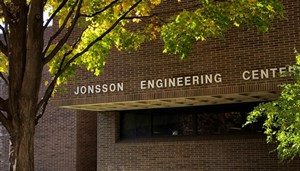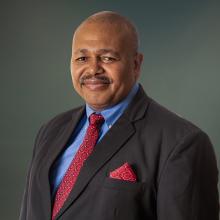
On a multidisciplinary and intercontinental journey, building bridges among people, and the future of Africa
Tell us a bit about yourself.
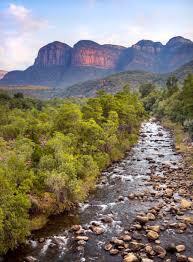
I grew up in the northern part of South Africa, in the historic area of Sekhukhuniland in the old Transvaal Province, the present-day Limpopo Province. The area was named after my great-grandfather, King Sekhukhuni I.
I attended school in three different villages that culminated in my completion of high school at Phatametsane Senior Secondary School in 1985. I chose the school because of their mathematics and physical science offerings that would enable me to further my studies in science at university. There were few high schools offering mathematics and science at that time. This was a volatile period in South Africa with political unrest characterized by school disruptions at high schools and universities. The political turmoil was triggered by widespread rejection of a racially charged system of government commonly referred to as apartheid. The widespread popular unrest adversely affected schooling throughout the country in areas populated by black people.
It was risky attending college in the country as classes were commonly cancelled and police would raid college campuses in attempts to quash unrest. Students on bursary funding would often forfeit their funding if an academic year was not completed ceremoniously. I obtained a USAID bursary to study mathematics at Morris Brown College in Atlanta, Georgia, from 1987 to 1991.
I completed my undergraduate classes during my junior year. As a result, I started attending graduate mathematics classes at Clark Atlanta University. I took classes with Professor J. Ernest Wilkins Jr., the Distinguished Professor of Mathematics and former President of the American Nuclear Society. He was a mechanical engineer, mathematician, and nuclear scientist. His contributions to the Manhattan Project are well-documented. Professor Wilkins offered me a scholarship to study an MSc in Mathematics with applications in heat rejection systems of nuclear power plants. Clark Atlanta University did not offer Ph.D. in mathematics at the time. He advised me to publicly defend my master’s thesis. This was nerve-wrecking but exciting. It went very well.
What led you to pursue a Ph.D. in mathematics? What was your Rensselaer experience like?
RPI had a dual degree program with colleges in the Atlanta University Center. Students could study a degree in science and then complete the engineering degree at RPI. I learned of RPI in my Introduction to Engineering class from that program.
Completing a Ph.D. in mathematics was a childhood dream for me. I was in grade seven when I expressed my intention to do this. I did not know what it entailed at the time. The inspiration later in life came from my Department of Head at Morris Brown College, one Professor Edet. He encouraged me to consider this as a freshman. He started to involve me in undergraduate summer research projects very early on. The optimization of heat rejection systems of nuclear power plants with Prof. Wilkins sealed the deal for me.
SIAM articles about applied research at RPI were quite impressive. I chose RPI for my Ph.D. because I had wanted to work in industry. My experience at RPI was great. Professor Isom Herron was my advisor. He contacted me while I was in South Africa to inform me of my acceptance into the Ph.D. program. The professors were heavily involved in in cutting-edge research with applications in a myriad of exciting topics.
Life at Rensselaer was awesome. One of the things I enjoyed the most was the diversity of disciplines in classes. Working on assignments with engineers, physicists, chemists, and computer scientists to solve complex assignments was quite instructive. This prepared me well for the place of work. The ecosystem was positive and empowering in many ways.
I was given the distinction of having the best mathematics research and won Jacquim B. Diaz prize in Mathematics in 1999. This was exciting.
Is there a memory from your RPI days that you wish to share?
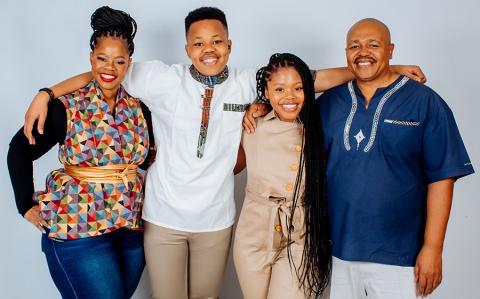
I have many great memories about RPI. I was given the distinction of having the best mathematics research and won Jacquim B. Diaz Prize in Mathematics in 1999, the year I defended my thesis. This was the culmination of years of hard work in a very positive environment.
I met my wife, Rebecca, at RPI. My daughter, Imani, was born in Troy. My wife, her sister Angel and I graduated from RPI. Rebecca got a Ph.D. in mathematics while Angel earned a Bachelor of Science degree in biomedical engineering. RPI is a big part of my family.
How did Rensselaer education prepare you for success? What do you think distinguishes Rensselaer?
A lot of the projects I have worked on are multidisciplinary in nature. Exposure to different engineering disciplines, involvement in graduate course work with engineers solving complex problems and observing different approaches to solving intricate problems helps one to work seamlessly with people of different technical backgrounds. RPI gave me that exposure. I hit the ground running when I joined the aeronautic systems group at the CSIR.
The Ph.D. program itself, in my view, was designed to have a multidisciplinary structure. I had a feeling that there was a deliberate effort to foster collaboration. This auger well for work in industry where projects involve teams as opposed to individuals. The system emphasizes academic excellence, diversity of technical prowess, and teamwork.
At the time when I completed my Ph.D., a significant number of graduates, in the Mathematics Department, went to work in industry. This was a distinguishing factor for me. I am not certain that it is a unique feature, but it is a very important attribute for me.
Tell us about your journey to become a successful leader.
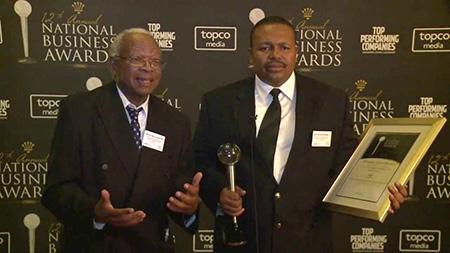
My understanding of modern enterprises, small or big, is that their business largely entails delivering satisfactory value to key stakeholder groups as part of their measure of success. These stakeholders may include shareholders, customers, suppliers, employees, government authorities, etc. Modern enterprises must deal with an additional basket of activities that constitute a license to operate, for example, environmental stewardship, diversity management, corporate responsibility, humane treatment of vulnerable groups, etc. I honed my management and leadership skills in a research, development, and innovation organization that is government owned within a society in transition, the Republic of South Africa. We have a lot of stakeholders. Relationship management is paramount. Developing sound relationships with employees, maintaining networks with different industry players, universities, technocrats, experts in different enterprises, policy makers, and other stakeholders is top of mind in my position.
One of the first things I had to fix in my first senior management position was to sort out a million-dollar invoice that a big defense industry company refused to pay. This had already served on the company board of directors. One of my fellow alumnus from the executive program I had just completed, who was a company executive, introduced me to the manager in charge. We related well with each and after some joint investigation we managed to get to the bottom of the issue. The invoice was settled within two months following delivery of some outstanding work. The root-cause of the problem was a toxic relationship between some employees of both companies.
My journey has been interesting, to say the least. I joined a team of about 60 engineers and scientists working largely on aeronautical systems. Having studied mathematics, fluid dynamics, physics, etc., I understood and enjoyed the work immensely. I was successful at my job. My success earned me the privilege to manage R&D teams and eventually the senior management position.
I developed an understanding of different modalities of value creation through the R&D process. Managing knowledge workers or experts is a challenge. It is a bigger challenge to develop and maintain high performing teams. I had the opportunity to do these and fared well doing this.
I was promoted to manage CSIR Aeronautic Systems around 2005 following management training and attendance of the Executive National Security Program.
Africa has tremendous natural resources and amazing people. What do you see as exciting opportunities for the continent, for your country?
The African continent is full of young people. It is crucial that we develop as many young people as possible to have potent workforce that can lead the drive for economic growth of the continent. We need ambitious programs with marquee institutions like RPI to develop the workforce on a scale. As a continent, we are predisposed to thrive in the next global energy economy due to massive mineral deposits required for battery technologies and production of hydrogen. It is my wish that the mining, beneficiation, and trade of these minerals and resulting products translate into massive transnational economic growth and commensurate wealth dividend that yields high-paying jobs for Africa. I am hoping this envisioned growth wipes out significant poverty levels and inequality that is endemic in the region. The quality of the solar coverage on the continent is very high. The energy transition that we are entering into requires leadership in all spheres of human endeavor. I am hoping the continent gets this right for the sake of humanity. It is important that we meet and exceed United Nations development goals in all the developing world.
How can we build bridges among people? What do you think we can achieve together?
There are saintly ambitions that we all share about the collective state of human condition. My wish is that every human being, at some point in our collective development, enjoys full human rights and they are free from strife and oppression. The achievement of UN development goals, when achieved, will signify notable improvement of the human condition across the world.
Building positive relationships among people, leaders, institutions, and countries based on our shared humanity and best interests is a good start. Protecting and defending the rights of all people, empowering marginalized people, being kind to one another, and working on improving the human condition everywhere ought to be something we practice.
Promoting diversity everywhere and doing what is right for the common good gives us all a chance to build bridges among people across national boundaries and belief systems. At a personal level, I try to meet each person as an individual, not a representative of a group, with the hope of being able to see them at their best, the relatable part of their humanity that we all have. Hopefully I can project myself in a manner that others can see the best of me, the relatable part of my humanity. Individual connections are important to building good relationships. These often lead to bridges among people with deliberate efforts. After all I strongly believe that the most remarkable of individuals are found among all groups of people.
What do you do for fun?
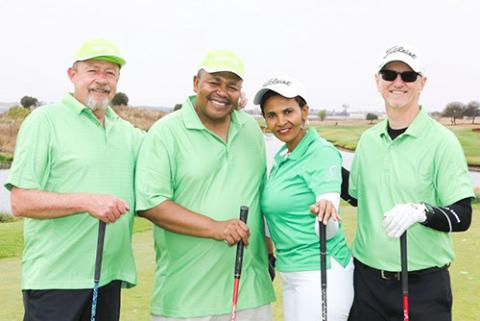
American football is something I liked a lot as a student. I was recruited to the football team in my sophomore year in college because they saw me play soccer for the varsity team. It turned out that I was good at it. I held both academic and athletic scholarships for my junior and senior years and built an almost 100% record on field goals for the period. This was at Morris Brown College in Atlanta, Georgia. Coverage of both college football and the NFL is not the same in South Africa. I am often out of touch.
I like watching rugby. The sport has a massive following in South Africa.
I enjoy playing golf with my friends, colleagues, and clients.
Soccer is another enduring interest of mine. I also enjoy watching soccer. I follow the English Premier League a lot and just about all the major tournaments around the world.
The book I am reading is Everybody Matters by Bob Chapman and Raj Sisodia. A very excellent read on caring for people one works with and those one manages.
I follow blogs on management, leadership, commercialization, industrialization, etc. I am a student of history. I am fascinated by different civilizations and how history is often documented.
I am not as well travelled as my heart desires. When I started college, I was hoping to visit all the 50 states in the United States. I need to finish this quest. I have enjoyed travelling in Asia, Africa, Asia, the Middle East, and the Americas on business. There are national parks and conservation areas that I have yet to visit in the U.S., Asia, and Africa that I wish to visit. There is a lot I wish to do that I hope will come to pass. I hope to visit all the continents.
What is your message to current Rensselaer students?
I think you have made a great choice by coming to Rensselaer. The degree programs, research programs, infrastructure, and the people around you are at the cutting edge. You will be ready for the place of work by the time you finish school. Dream big, apply yourself, build bridges with the people around you, and be ready to change the world.
